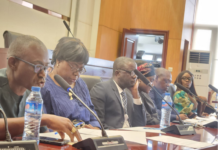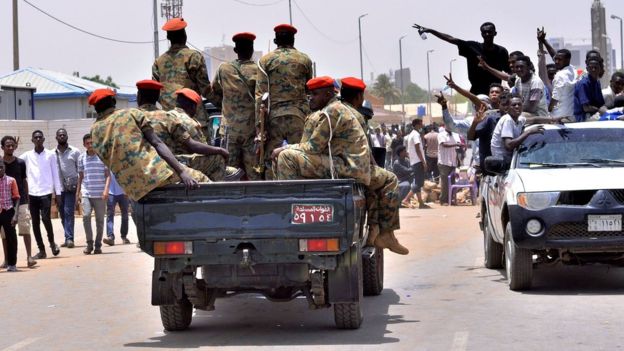After nearly 30 years in power, Sudan’s President Omar al-Bashir has been ousted and arrested, the defence minister says.
Speaking on state TV, Awad Ibn Ouf said the army had decided to oversee a two-year transitional period followed by elections.
He also said a three-month state of emergency was being put in place.
Protests against Mr Bashir, who has governed Sudan since 1989, have been under way for several months.
Meanwhile, the main group that has been organising the demonstrations rejected the military statement and called on people to remain at a sit-in outside army headquarters.
A BBC Correspondent in Sudan says protesters want a civilian council to lead the transition rather than a military one.
“I announce as minister of defence the toppling of the regime and detaining its chief in a secure place,” Mr Ibn Ouf said in a statement.
Mr Bashir’s exact whereabouts are not known.
Mr Ibn Ouf said the country had been suffering from “poor management, corruption, and an absence of justice” and he apologised “for the killing and violence that took place”
Mr Bashir is the subject of an international arrest warrant issued by the International Criminal Court (ICC), which accuses him of organising war crimes and crimes against humanity in Sudan’s western Darfur region.
However it is not clear what will happen to him following his arrest.
The protests were originally sparked by a rise in the cost of living, but demonstrators then began calling for the president to resign and his government to go.
Omar el-Digeir, a senior protest member, told AFP news agency last week that the group was seeking a path “that represents the wish of the revolution”.
Police had ordered officers not to intervene against the protests, but the government was criticised by rights groups for a heavy-handed response to the unrest.
Government officials say 38 people have died since the unrest began in December, but the pressure group Human Rights Watch said the number was higher.
In February, it looked as though the president might step down at that point, but instead Mr Bashir declared a state of national emergency.
Who is Omar al-Bashir?
Formerly an army officer, he seized power in a military coup in 1989.
His rule has been marked by civil war. The civil conflict with the south of the country ended in 2005 and South Sudan became independent in 2011.
Another civil conflict has been taking place in the western region of Darfur. Mr Bashir is accused of organizing war crimes and crimes against humanity there by the ICC.

























